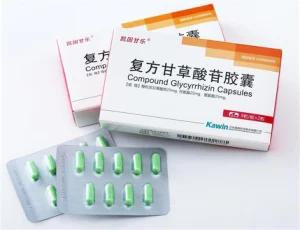Article
Glycyrrhizin May Alleviate Inflammation in Patients with UC
Author(s):
The bioactive triterpenoid saponin was associated with edema in treated patients.

Compound glycyrrhizin may reduce inflammation in patients with ulcerative colitis (UC), according to data from a new systematic review and meta-analysis. The exact pathogenesis of UC remains unclear, but emerging research has focused on managing intestinal inflammatory response via the targeting of anti-inflammatory and pro-inflammatory cytokines.
Compound glycyrrhizin, a bioactive triterpenoid saponin, has shown potential in alleviating inflammatory activity of other conditions, such as hepatotoxicity, eczema, and urticaria. However, comprehensive investigations of the efficacy and safety of the plant-derived bioactive compound in patients suffering from UC are currently lacking.
Treating UC with Different Dosages
To address this unmet need, a team of researchers from the Chengdu University of Traditional Chinese Medicine evaluated a total of 23 clinical studies representing 2060 participants. They sought to evaluate the anti-inflammatory activity and safety of compound glycyrrhizin when used as treatment for UC. They further assessed the most effective dosage form for these patients.
All clinical trials were extracted from PubMed, Embase, Cochrane Library, Web of Science, China National Knowledge Infrastructure, Chinese Biomedical Literature, Wanfang Database and CQVIP database, and were conducted between January 2000 - July 2021.
Of the total patient population, 1031 were in the treatment group, and 1029 were in the control group. Of the 23 studies, 57% evaluated glycyrrhizin as a tablet, 39% as an injection, and 4% as a capsule. Furthermore, 30% of the studies assessed glycyrrhizin in combination with sulfasalazine, 52% with mesalazine, and 9% with glutamine. Only 2 studies assessed compound glycyrrhizin on its own.
Anti-Inflammatory Activity of Compound GL
Pooled results from 8 clinical trials suggested that compound glycyrrhizin may lead to significant reductions in the level of TNF-α compared with the control group (n = 890, SMD = -2.03, 95 % CI, -2.61 to -1.44, P<.00001).
Across 11 studies, the treatment group showed lower levels of IL-6 compared with the control group control group (n = 1109, SMD = -2.98, 95% CI, -3.71 to -2.25, P<.00001). Treated patients in 8 studies had lower expression of IL-8 (n = 918, SMD = -1.55, 95% CI -1.79 to -1.30, P<.00001).
Furthermore, 3 studies indicated that treatment with glycyrrhizin could significantly increase expression of IL-10 (n = 240, SMD = 4.14, 95% CI, 3.47-4.80], P<.00001). Reductions in expression of IL-17 in treated patients were shown in 4 studies (n = 343, SMD = -1.70, 95% CI -1.95, to -1.45, P<.00001).
The investigators observed no significant influence of combination drugs on levels of TNF-α (P = .92), IL-6 (P = .14), IL-8 (P = .47), and IL-17 (P = .72). Capsule glycyrrhizin was considered most beneficial to levels of TNF-α (P = .0001) and IL–8 (P = .03). Injections were most beneficial to expressions of IL-6 (P < .00001) and IL-10 (P = .04).
“These findings supported the anti-inflammatory activity of compound GL when used in the treatment of UC,” the investigators wrote. “In addition, compound GL can alleviate the adverse effects of conventional drugs (e.g. sulfasalazine, mesalazine), but it can also lead to edema.”
They acknowledged that further studies are needed to assess the safety of glycyrrhizin and its potential mitigation of adverse events linked to other therapeutic drugs. Furthermore, they noted that additional research should focus on the effect of dosage forms on inflammatory factors in patients with UC.
The study, “Anti-inflammatory activity and safety of compound glycyrrhizin in ulcerative colitis: A systematic review and meta-analysis of randomized controlled trials,” was published online in Journal of Functional Foods.





